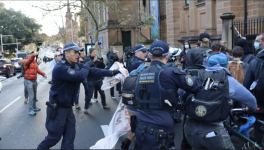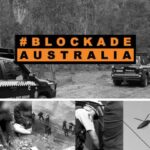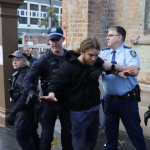Bail and Remand Are Being Weaponised to Stamp Out Climate Activism

“Police are weaponising the legal system to disable climate activists” is the charge Blockade Australia levelled against NSW law enforcement in an online post last month, following a recent blitz on its activities.
“Peaceful protesters are receiving bail conditions more punitive than those meted out to violent sex offenders.”
The climate defence group is not alone in its assessment that certain legal mechanisms designed to ensure court attendance and public safety are currently being used in an effort to stamp out nonviolent protest actions targeting the continued use of fossil fuels to the detriment of climate.
The 29 June Blockade Australia post further outlines that dozens of recently arrested climate defenders had received “a litany of absurd and punitive bail conditions”, including non-association orders, curfews, and prohibitions on using encrypted messaging.
The issue of extreme bail conditions being applied to nonviolent climate protesters has been raised since the 2019 Extinction Rebellion spring actions. But the last 12 months have seen a drastic rise in the breadth of bail restrictions, as well as a spike in remanding and sentences handed down.
This questionable use of criminal justice mechanisms has further been accompanied by the roll out of the most extreme anti-protest regime in the country and the establishment of the climate action-focused NSW Police Strike Force Guard, which has since carried out stakeouts and raids.
Extralegal punishments
“One of the most important features of the Bail Act is that bail conditions and remand are used only in circumstances where bail concerns arise,” NSW Council for Civil Liberties (NSWCCL) president Josh Pallas told Sydney Criminal Lawyers.
Section 17 of the Bail Act 2013 (NSW) requires an authority to determine whether an accussed is eligible to be released based on their likelihood to show up in court or to commit a serious crime, along with whether they pose a danger to others or might interfere with witnesses or evidence.
“In determining whether a bail concern is present,” the lawyer continued, “the authority making the bail determination must consider things like a person’s background, criminal history, the seriousness of the offence, whether there is a history of violence or noncompliance with court orders.”
According to Pallas, it’s hard to see how the imposition of curfews, preventing contact between friends and being compelled to hand over passwords to electronic devices are conditions that are “proportionate and necessary” in relation to being charged over peaceful protests.
“It’s even harder to see how remanding a person in custody is necessary or proportionate,” Pallas added. “It seems as though some of the conditions are targeted towards splitting up protest groups, stifling further actions, and intimidating protestors who may be considering similar actions.”
Questionable logistics
In terms of being remanded, after being arrested during a botched NSW police operation at a private property in the Colo Valley on 19 June, activists Max Curmi and Tim Neville were detained without conviction, despite posing no public threat, only to be released on appeal three weeks later.
A group of climate defenders were camped out at the Colo property in preparation for a week-long series of nonviolent direct actions set to take place in the Sydney CBD commencing on 29 June. And on the morning of the 19th, a few spotted some men hidden in bushes watching the activist camp.
The two men dressed in camouflage and refusing to identify themselves to those present were police officers spying on the camp, who then attempted a dangerous escape in an unmarked car. And when that failed, dozens of NSW police officers raided the property and arrested seven activists.
Pallas advised that there’s no other way to see the raid than as an example of police overreach, which is an assessment that applies to further measures taken in the days following. And he added that the tactics are “intended to provoke feelings of fear and insecurity” in order stamp out protest.
Prior to the week of planned disruptions in the city, police raided the Colo property a second time, visited protesters at home and pulled them over in cars. Demonstrators were later arrested for participating in the CBD protests days after the fact, and officers stormed an activist picnic in a park.
“NSWCCL has expressed continued concerns about increasingly harsh and disproportionate laws and actions taken against political protesters in recent years,” Pallas underscored, “and it supports victims of such laws and actions.”
A rising tide
As Blockade carried out two weeks of successful nonviolent direct actions at Newcastle Coal Port last November, NSW police threatened activists with the use of an old law carrying 25 years inside, a local environment centre was raided, and an activist was sentenced to 12 months prison time.
Following another series of Blockade actions at Porty Botany in March, which coincided with Fireproof Australia blocking major roadways during peak hour traffic around Sydney, the Perrottet government rushed through unprecedented penalties that now apply to unauthorised protests.
“The most recent anti-protest laws passed were draconian, repressive and clearly for the benefit of business and financial interests who stand against appropriate action on climate change,” Pallas made clear.
The laws applying to unauthorised protests involving the obstruction of roads, tunnels, bridges and major facilities now carry up to 2 years imprisonment and/or a $22,000 fine. Prior to the changes, the usual charge was the summary offence of obstructing traffic, which carries a fine of $440.
The NSWCCL recently joined a coalition of unions and civil society groups, calling on NSW Labor to support a disallowance motion by Greens MLC Abigail Boyd to drop the regulatory changes made in relation to the anti-protest laws. However, state opposition continued to support the laws.
“So, whether the government changes next year or not, neither the Coalition nor Labor have a strong track record of standing with protestors. And I can’t see an end to the government trying to clamp down on peaceful protest in the near future,” Pallas said in conclusion.
“But governments of any colour better be ready, because as the climate emergency continues to escalate, I suspect that the number of people wanting to engage in peaceful and disruptive protest will too.”







